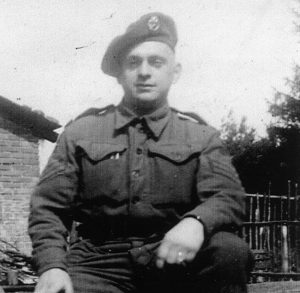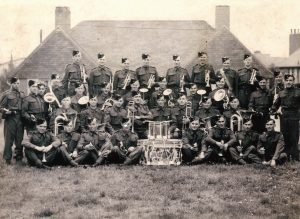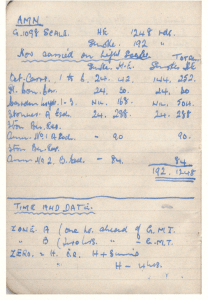CSM William Gordon Ternouth
Service Number 5438203
Mortar Platoon, Support Company, 5th Battalion Duke of Cornwall’s Light Infantry

Given that the 5th were a territorial battalion, a large proportion of the soldiers that originally served with the battalion were Cornishmen belonging to local Cornish communities. Though, after initial reinforcements to bring the Battalion up to fighting strength, together with casualties, transfers, and replacements, the balance of Cornishmen to those from other parts of the United Kingdom inevitably shifted.

Nevertheless, there was always a strong cadre of Cornishmen to keep tradition alive. One such man was William Gordon Ternouth; a part-time Territorial before the outbreak of the Second World War. For the duration of the Second World War, Gordon served with the 5th Battalion. Given that the number of casualties coming from the 5th battalion fighting in North West Europe was so high between June 1944 to the end of the war, Gordon’s length of service was a certainly an achievement.
The impression given of Gordon by his comrades and from the little material we have within our archives, is of someone who had a strong sense of duty, a pillar of the local community and a family man. He was also musically talented, joining the Regimental Band, playing the trombone. Initially perhaps, it might also be assumed that Gordon had a fairly ‘comfortable’ time of it in his theatre of war. In fact, nothing could be further from the truth. As the Serjeant in charge of the Mortar Platoon he saw constant action from the first battle to the last during the liberation of Europe. Whilst the Mortar Platoon would have typically been stationed a little back from the front line it would still have been an extremely dangerous place to be. The task of the mortars was to immediately provide supporting fire to their own Companies, both in attack and defence. Therefore, it was almost certain that the enemy would be looking for mortars to carry out counter-battery fire.
Of particular interest for those interested in the logistics of war, we have in our archives, modern scans of two of Gordon’s wartime notebooks (see below). One of which was actually captured from the Germans and used for Gordon’s own purposes. These notebooks were used to record the minutiae of army life; included are loading plans for the various vehicles of the Mortar Platoon, details of equipment, how to write up bombing or shelling reports, lists of men with their service number, computation for firing plans, Prisoner of War reports, returns (of casualties), situation reports, ammunition returns, range settings for mortar, British divisional list for Europe, names and addresses of soldiers (possibly of his own unit).

From lorries to Bren Gun Carriers, incredibly, from Gordon’s notebook, we have been able to discern specific figures relating to the overall total number of vehicles and equipment for the Platoon. For Gordon’s platoon, the average amount carried appears to be 192 smoke rounds and 1248 High Explosive (HE) rounds. This was a standard, presumably during a build up for an attack the rounds would have been stockpiled. The numbers are certainly impressive; a conservative estimate would put 101,088 HE mortar rounds ready to use and available on the Western Front in 1944-45. This total is for one type of weapon!
Upon return to civilian life Gordon continued to support his local community and retained his many and varied interests including singing with the St Dennis Male Voice Choir, supporting his local church, and relaxing with a game of snooker. Gordon married his sweetheart, Edna, in 1940 and they were together until Gordon passed away in 1994. In the words of Serjeant Frank Grigg, “To have known Gordon . . . was to know a great comrade and a true friend.” Perhaps we can add, “a fine Cornish Territorial.”
Written by Andrew Sims, Archivist at Bodmin Keep June 2021
